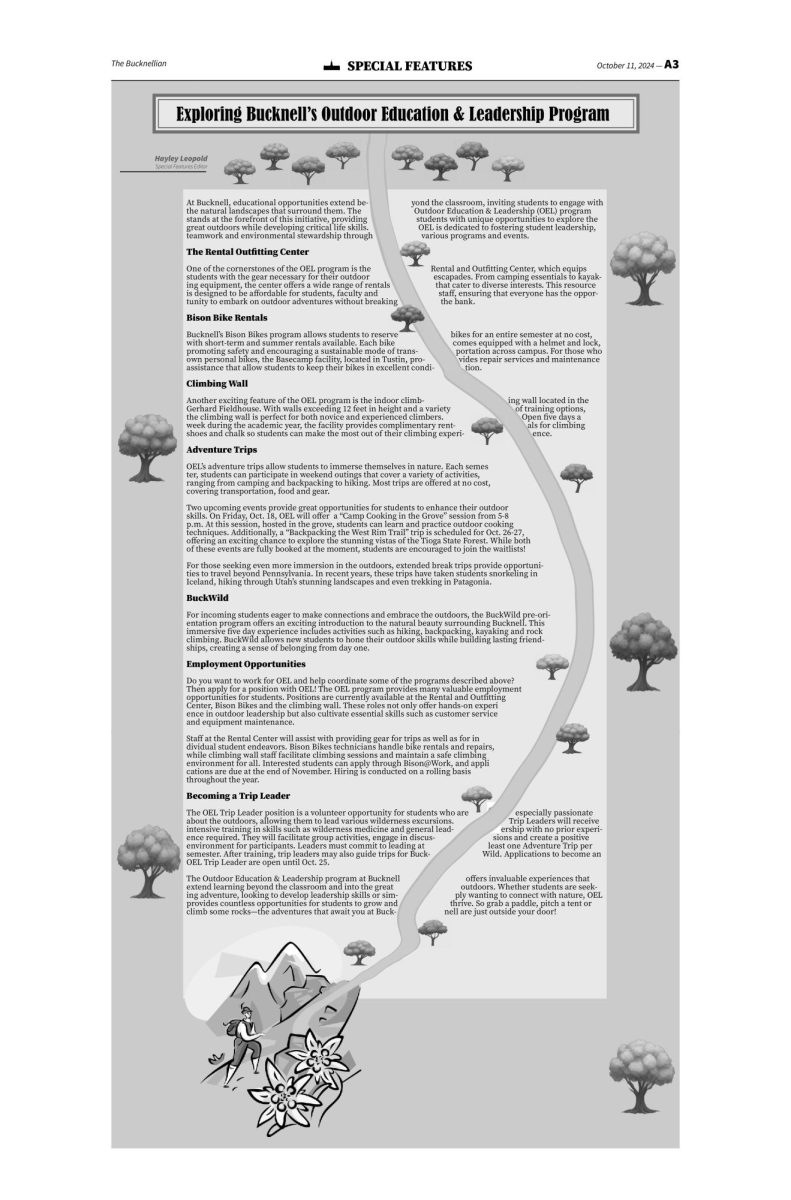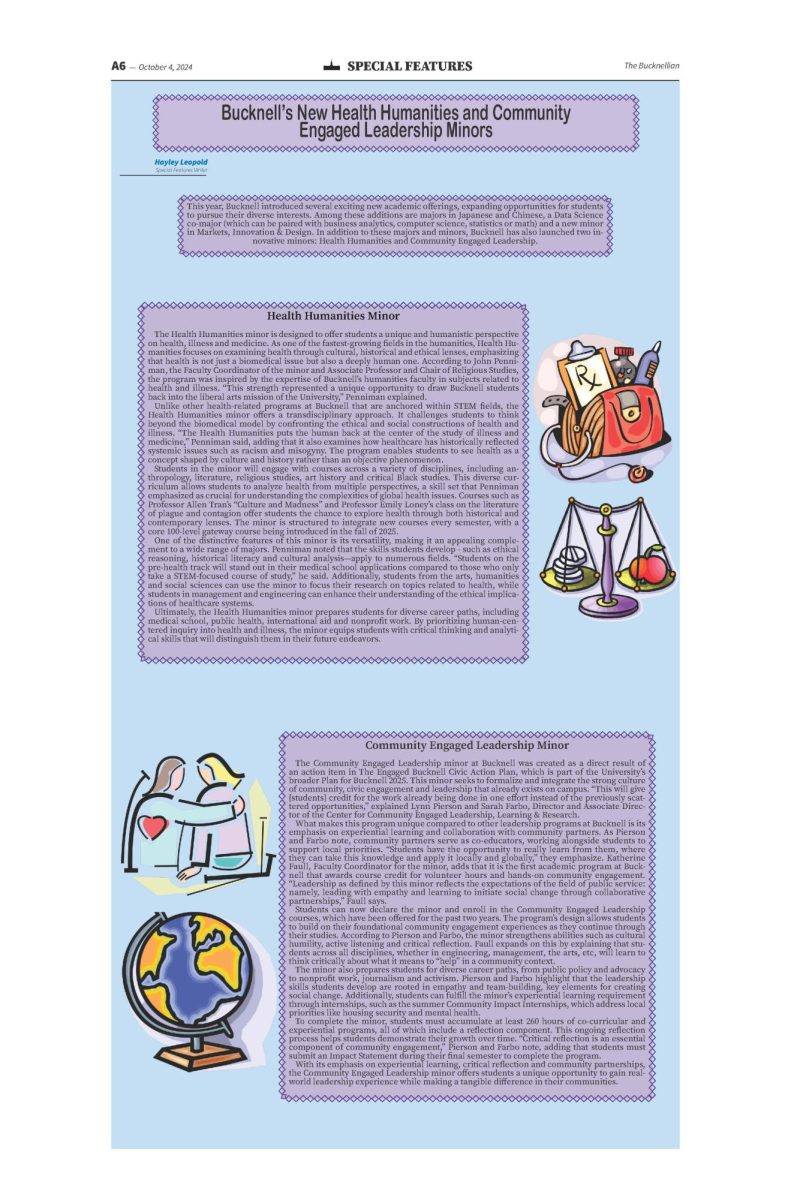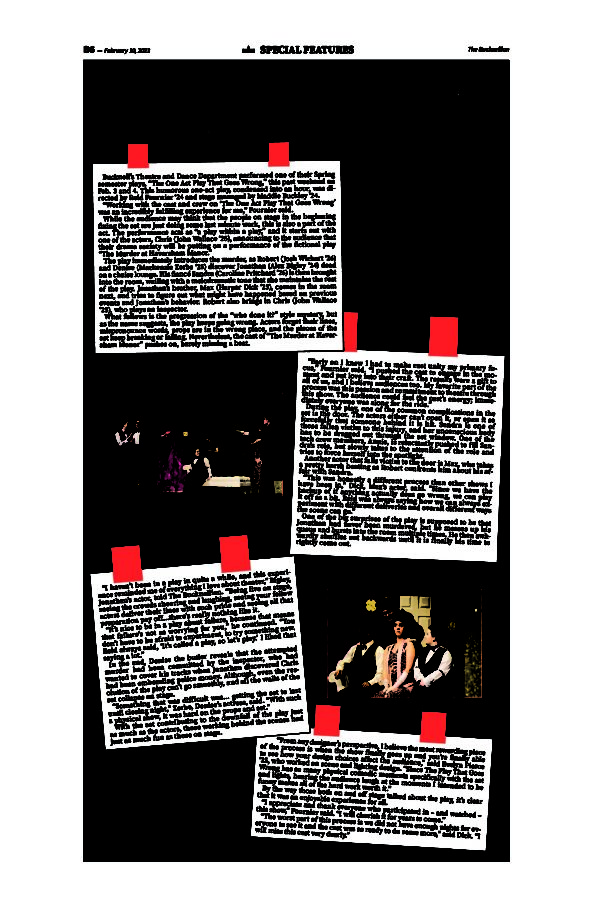Bucknell Theatre Department’s play goes wrong
February 10, 2023
Bucknell’s Theatre and Dance Department performed one of their Spring semester plays, “The One Act Play That Goes Wrong,” this past weekend on Feb. 3 and 4. This humorous one-act play, condensed into an hour, was directed by Reid Fournier ‘24 and stage managed by Maddie Buckley ‘24.
“Working with the cast and crew on ‘The One Act Play That Goes Wrong’ was an incredibly fulfilling experience for me,” Fournier said.
While the audience may think that the people on stage in the beginning fixing the set are just doing some last minute work, this is also a part of the act. The performance acts as “a play within a play,” and it starts out with one of the actors, Chris (John Wallace ‘25), announcing to the audience that their drama society will be putting on a performance of the fictional play “The Murder at Haversham Manor.”
The play immediately introduces the murder, as Robert (Josh Wickert ‘26) and Denise (Mackenzie Zerbe ‘25) discover Jonathan (Alex Bigley ‘24) dead on a chaise lounge. His fiancé Sandra (Caroline Pritchard ‘26) is then brought into the room, wailing with a melodramatic tone that she maintains the rest of the play. Jonathan’s brother, Max (Harper Dick ‘25), comes in the room next, and tries to figure out what might have happened based on previous events and Jonathan’s behavior. Robert also brings in Chris (John Wallace ‘25), who plays an inspector.
What follows is the progression of the “who done it?” style mystery, but as the name suggests, the play keeps going wrong. Actors forget their lines, mispronounce words, props are in the wrong place, and the pieces of the set keep breaking or falling. Nevertheless, the cast of “The Murder at Haversham Manor” pushes on, barely missing a beat.
“Early on I knew I had to make cast unity my primary focus,” Fournier said. “I pushed the cast to engage in the moment and put love into their craft. The results were a gift to all of us, and I believe audiences too. My favorite part of the process was this passion and commitment to theatre through this show. The audience could feel the cast’s energy; immediately everyone was along for the ride.”
During the play, one of the common complications in the set is the door. The actors either can’t open it, or open it so forcefully that someone behind it is hit. Sandra is one of those fallen victim to this injury, and her unconscious body has to be dragged out through the set window. One of the tech crew members, Annie, is reluctantly pushed to fill Sandra’s role, but slowly takes to the attention of the role and tries to force herself into the spotlight.
Another actor that falls victim to the door is Max, who takes a pretty harsh beating as Robert confronts him about his affair with Sandra.
“This was honestly a different process than other shows I have been in,” Dick, Max’s actor, said. “Since we have the backup of if anything actually does go wrong, we can play it off as a bit. Reid was always saying how we can always experiment with different deliveries and overall different ways the scene can go.”
One of the big surprises of the play is supposed to be that Jonathan had never been murdered, but he messes up his queue and bursts into the room multiple times. He then awkwardly shuffles out backwards until it is finally his time to rightly come out.
“I haven’t been in a play in quite a while, and this experience reminded me of everything I love about theater,” Bigley, Jonathan’s actor, told The Bucknellian. “Being live on stage, seeing the crowds cheering and laughing, seeing your fellow actors deliver their lines with such pride and seeing all that preparation pay off…there’s really nothing like it.
“It’s nice to be in a play about failure, because that means that failure’s not as worrying for you,” he continued. “You don’t have to be afraid to experiment, to try something new. Reid always said, ‘It’s called a play, so let’s play.’ I liked that saying a lot.”
In the end, Denise the butler reveals that the attempted murder had been committed by the inspector, who had wanted to cover his tracks when Jonathan discovered Chris had been embezzling police money. Although, even the resolution of the play can’t go smoothly, and all the walls of the set collapse on stage.
“Something that was difficult was… getting the set to last until closing night,” Zerbe, Denise’s actress, said. “With such a physical show, it was hard on the props and set.”
With the set contributing to the downfall of the play just as much as the actors, those working behind the scenes had just as much fun as those on stage.
“From any designer’s perspective, I believe the most rewarding piece of the process is when the show finally goes up and you’re finally able to see how your design choices affect the audience,” said Evelyn Pierce ‘25, who worked on scene and lighting design. “Since The Play That Goes Wrong has so many physical comedic moments specifically with the set and lights, hearing the audience laugh at the moments I intended to be funny makes all of the hard work worth it.”
By the way those both on and off stage talked about the play, it’s clear that it was an enjoyable experience for all.
“I appreciate and thank everyone who participated in – and watched – this show,” Fournier said. “I will cherish it for years to come.”
“The worst part of this process is we did not have enough nights for everyone to see it and the cast was so ready to do some more,” said Dick. “I will miss this cast very dearly.”



























